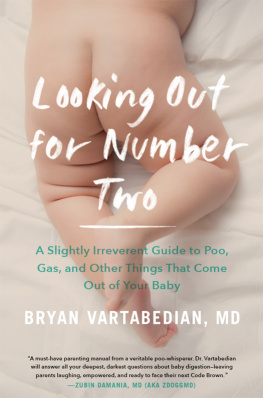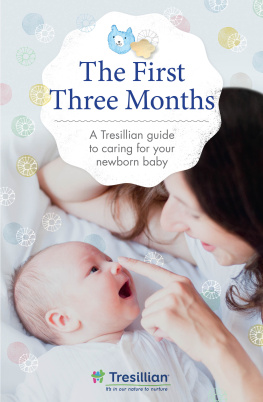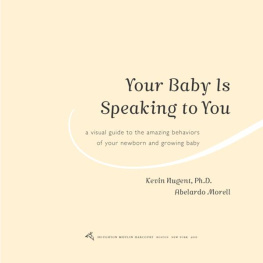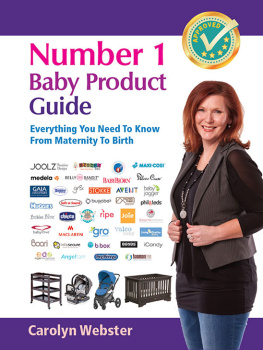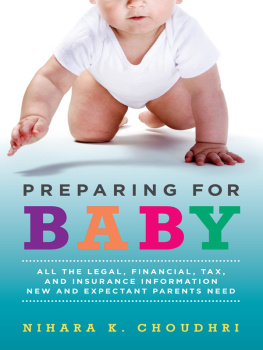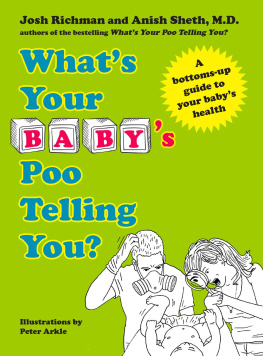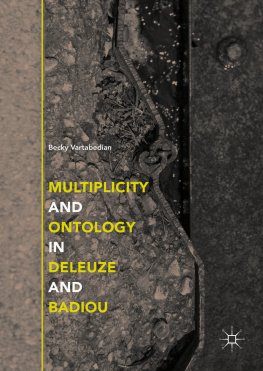For Bill Klish
Like many other women, I could not understand why every man who changed a diaper has felt impelled, in recent years, to write a book about it.
BARBARA EHRENREICH
CONTENTS
Guide
I AM THE POO WHISPERER
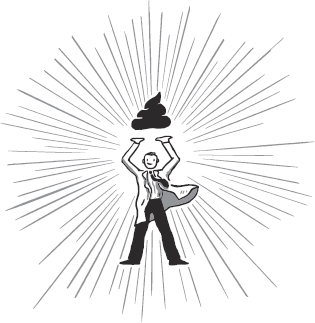
M OST PEDIATRICIANS LISTEN TO A PARENTS STORY AND OFFER A DIAGNOSIS; I look at a diaper and tell the parent their babys story. What repulses others has become my medium.
While some see a heavy, wet, rolled-up diaper as the end of something, I see it as just the beginning. If the eyes are the window to the soul, a full, fragrant diaper is the lens into a babys biologic destiny. As youll learn in Looking Out for Number Two, what happens in the deepest, darkest crevices of the bowel shapes a growing babys future.
Dramatic? Maybe not. Read on and youll see that theres a story unfolding around what your baby makes.
WHY A BOOK ON POO?
Lets face it: babies dont seem to do a lot. They eat, sleep, and poo. So when it comes to knowing when somethings up, we measure what they eat, watch how they sleep, and look at their poo.
And when it comes to their poo, a lot is going on down there. You can see it, youll probably feel it, and youll definitely smell it. Poo can tell you many things about a babys general health.
But we dont think enough about poo and what we can learn from it. The subject is cut short in most parenting books. I want to change that.
What you have in your hands is a field guide to the stuff that comes out of your baby. Its the owners manual they never gave you in the nursery. Think of it as what to expect when theyre pooping.
WHY POO IS IMPORTANT
Traditionally, theres been a war on poo. Its the brunt of our jokes and the last thing we consider when it comes to raising happy, immunologically robust babies. But while it was long thought of as something to just wipe and flush, it turns out that what fills your babys diaper serves an important role in shaping your babys developing immune system.
A babys gut is the breeding ground of the babybiome, a massive population of bacteria that are in constant communication with the immune system. And as the home of 70 percent of a babys immune system, the gut is the bodys biggest organ when it comes to making sense of the world. Everything that goes through your babys tummy is seen by her immune system and creates a type of immunologic experience or wisdom, as well see in the coming pages. How we seed, feed, and fuel the gut early on can have a critical impact on a babys lifelong health.
And while were shifting our perspective on the poo front, we should consider a related area that has traditionally been an afterthought for parents: feeding and nutrition in babies. Milk, be it from the bottle or breast, is typically thought of as something to keep a baby fat and happy, a simple substrate for sustenance and satisfaction. But like poo, the things we use to fuel a baby can make or break the way a body and brain grow and react to the world. Changes in the types of protein, for example, or the presence or absence of certain bacteria are critical factors in shaping lifelong health.
So what we give babies and what babies give back are important indicators of health. Unfortunately, so much of this amazing information on babies and bowels has been restricted to research articles and the minds of experts. Thats where Looking Out for Number Two comes in. My goals are threefold: To translate this material in a way that makes it applicable to you as a parent. To popularize and define the connection between the gut and the body and the bigger world into which a baby is born. And to get parents talking and thinking about the enteric brain (thats the nervous system in the gut, and, yes, thats a real thing), the fourth trimester of gut development (the first three months of life), and the reality of baby poo as a living, breathing organ.
Number Two is more than a book... its a movement.
HOWS HER POO?
Most health professionals begin conversations about health in babies with predictable questions about development, feeding, or sleeping. These are the metrics that have traditionally defined the well-being of a baby. When I open up a conversation about a baby, I say, Tell me about her poo. Sure, its an awkward question when visiting with friends over dinner, but its a timely and important launching point in a medical context, given what we know about the gut and its miraculous work. What goes on inside a baby and what a baby leaves behind in her diaper tell so much about her well-being. And weve only begun to scratch, or wipe, the surface.
IVE SEEN MORE POO THAN YOU
Looking Out for Number Two is loaded with the latest research, but a lot of it has been shaped by my experience as well. For the last twenty years its been my job to understand and think about babies from the inside out. Im a pediatric gastroenterologist at Texas Childrens Hospital, the largest childrens hospital in America. Ive seen a lot of babies, and Ive studied, smelled, and driven endoscopes straight through the stuff that comes out of them. I hope my comfort and passion about all things digestive will be reflected in the pages ahead, and that the knowledge Ive gained will help put you at ease with the various diaper patties generated by your little bundle of joy.
YOU DONT NEED THE NEW ENGLAND JOURNAL OF MEDICINE TO SHOW YOU HOW TO WIPE YOUR BABYS BUM
Because some of what youll find here represents the patterns Ive seen and learned in over two decades as a doctor, not all of it is supported by journal articles or committees of discerning old men. And thats fine. Much of what we do in the care and handling of babies is based on practical wisdom.
I have full respect for those colleagues who work tirelessly to advance the margins of science and digestive health. But my goal here is to create a user-friendly compilation of translated science and care. Number Two is intended to serve as a practical guide to the inner workings of the baby. Science meets sensibility in this book, and its delivered in a way thats informative, entertaining, and practical. It doesnt claim to be comprehensive, but at the end of the day I hope it will spark curiosity over something that young parents would have otherwise overlooked.
HOW THIS BOOK IS ORGANIZED
The layout of this book is simple. The first part covers what goes into your baby and the second part covers what comes out of your baby. While you could argue that Ive misled you by selling a book on poo thats really only half a book on poo, the truth is that you cant understand elimination without a nod to nutrition. If youre obsessed with poo and poo alone, jump to part two.
Otherwise, feel free to just poke around. While the front-to-back narrative is laid out as a logical sequence of approachable physiology and fascinating diaper tricks, you can also just thumb through to discover some really interesting things happening inside your baby.
To make for easy navigation, the two parts of Looking Out for Number Two are organized into interesting bits of information under compelling subheadings. While the subheadings should clearly convey the information in a given section, I can neither confirm nor deny that many also contain poo-related puns. Consider yourself warned.
SOME HOUSEKEEPING
Following are a few things to keep in mind as you read or thumb through the book.
YOUR MILEAGE MAY VARY
No two babies are alike. Whenever I drop the mileage may vary comment in the pages ahead, it means that things may work out a little differently for your baby. Babies dont read. And they certainly dont read medical textbooks. When we try to apply one set of rules to something as crazy and varied as poo, gas, and burping, were bound to wind up someplace bad.
Next page
